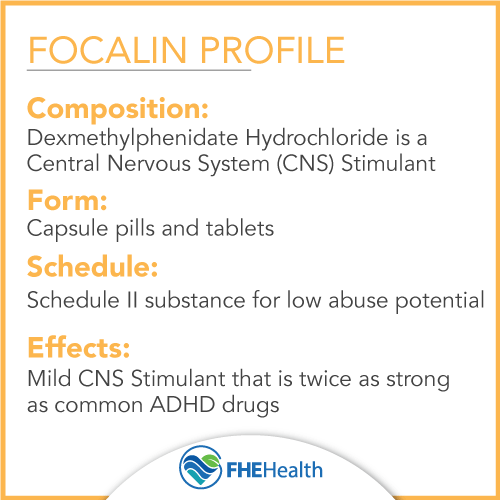Mark Halsey is a licensed therapist, founder, and chief editor of Clean Break Recovery. With over a decade of addiction treatment experience, Mark deeply understands...Read more
Are you looking for a stimulant that can boost your focus and concentration? Focalin is a popular stimulant drug that has been used to treat Attention Deficit Hyperactivity Disorder (ADHD) and narcolepsy. In this article, we will explore the effects of Focalin, what it is used for, and the potential side effects. We will also look at whether Focalin is a stimulant or not. Read on to learn more about Focalin and its potential benefits and risks.

What is Focalin and How Does it Work?
Focalin is a central nervous system (CNS) stimulant medication used to treat Attention Deficit Hyperactivity Disorder (ADHD). It is generally prescribed to those aged 6 and older, and works by increasing the amount of dopamine and norepinephrine in the brain. By doing this, it helps to improve focus, concentration, organization, and impulse control. Focalin comes in both immediate-release and extended-release forms, and is available in both capsule and tablet form.
What Are the Benefits of Focalin?
Focalin is an effective medication for ADHD, and has been shown to improve focus, concentration, and organization. It can also reduce impulsivity, hyperactivity, and restlessness. Additionally, it can help improve impulse control, allowing users to think before they act. It can also help improve academic and social functioning.
Are There Any Side Effects or Risks of Taking Focalin?
Like all medications, Focalin does carry some risks. Common side effects can include headaches, nausea, stomach aches, insomnia, and decreased appetite. In some cases, it can also cause weight loss, irritability, and mood swings. It is important to talk to a doctor before taking Focalin, as it may not be suitable for everyone.
Is Focalin a Stimulant?
Focalin is a central nervous system stimulant, and is classified as a Schedule II controlled substance. It works by increasing the amount of dopamine and norepinephrine in the brain, which helps to improve focus, concentration, and other aspects of ADHD symptoms. Focalin should be used as directed by a doctor, and is not suitable for everyone.
What Are the Benefits of Taking Focalin?
Focalin is a highly effective medication for managing ADHD symptoms. It can improve focus, concentration, and organization. It can also reduce impulsivity, hyperactivity, and restlessness. Additionally, it can help improve impulse control, allowing users to think before they act. It can also help improve academic and social functioning.
Are There Any Risks or Side Effects of Taking Focalin?
Like with all medications, there are some risks associated with taking Focalin. Common side effects can include headaches, nausea, stomach aches, insomnia, and decreased appetite. In some cases, it can also cause weight loss, irritability, and mood swings. It is important to talk to a doctor before taking Focalin, as it may not be suitable for everyone.
Related Faq
What is Focalin?
Focalin is a central nervous system (CNS) stimulant medication prescribed to treat attention deficit hyperactivity disorder (ADHD) in children and adults, as well as narcolepsy in adults. Focalin is the brand name for dexmethylphenidate hydrochloride and comes in tablet, capsule, and liquid forms. The active ingredient in Focalin is dexmethylphenidate, which is a form of methylphenidate that is more quickly absorbed into the bloodstream.
Is Focalin a Stimulant?
Yes, Focalin is a stimulant. Stimulants increase alertness, attention, and energy. They also increase blood pressure, heart rate, and respiration. Focalin works by increasing levels of certain chemicals in the brain, such as norepinephrine and dopamine, which help to improve focus and concentration.
What is the Recommended Dosage for Focalin?
The recommended dosage for Focalin depends on the age and weight of the patient, as well as other factors. Generally, the starting dose for children aged 6 to 12 is 5 mg once or twice daily. For adolescents and adults, the starting dose is 10 mg once or twice daily. The maximum recommended dose is 40 mg daily, and the dose should be adjusted as needed.
Are there any Side Effects of Focalin?
Yes, there are potential side effects associated with Focalin. Some of the common side effects include insomnia, headaches, stomach ache, decreased appetite, and irritability. Less common side effects include increased heart rate, increased blood pressure, and tics. It is important to discuss any potential side effects with a doctor.
Who Should Not Take Focalin?
Focalin should not be taken by anyone with a known allergy to methylphenidate or any of the other ingredients in the medication. It should also not be taken by anyone with a history of drug or alcohol abuse, or by pregnant or breastfeeding women. It is important to discuss all medications, supplements, and medical conditions with a doctor before starting Focalin.
What Should I Know Before Taking Focalin?
Before taking Focalin, it is important to discuss any other medications, supplements, or medical conditions with a doctor. It is also important to inform a doctor of any history of drug or alcohol abuse, as Focalin may not be suitable for those with a history of substance abuse. It is important to discuss all potential risks and benefits with a doctor before taking Focalin.
Focalin XR
Focalin is an effective stimulant medication that can help people with ADHD and narcolepsy manage their symptoms. It is important to remember that it is a strong medication and should be taken as prescribed by a healthcare professional. When used properly, Focalin can help improve concentration, focus, and alertness and can provide improved quality of life for both adults and children.
Mark Halsey is a licensed therapist, founder, and chief editor of Clean Break Recovery. With over a decade of addiction treatment experience, Mark deeply understands the complex needs of those struggling with addiction and utilizes a comprehensive and holistic approach to address them. He is well-versed in traditional and innovative therapies, including cognitive-behavioral therapy, motivational interviewing, and mindfulness-based interventions.
More Posts